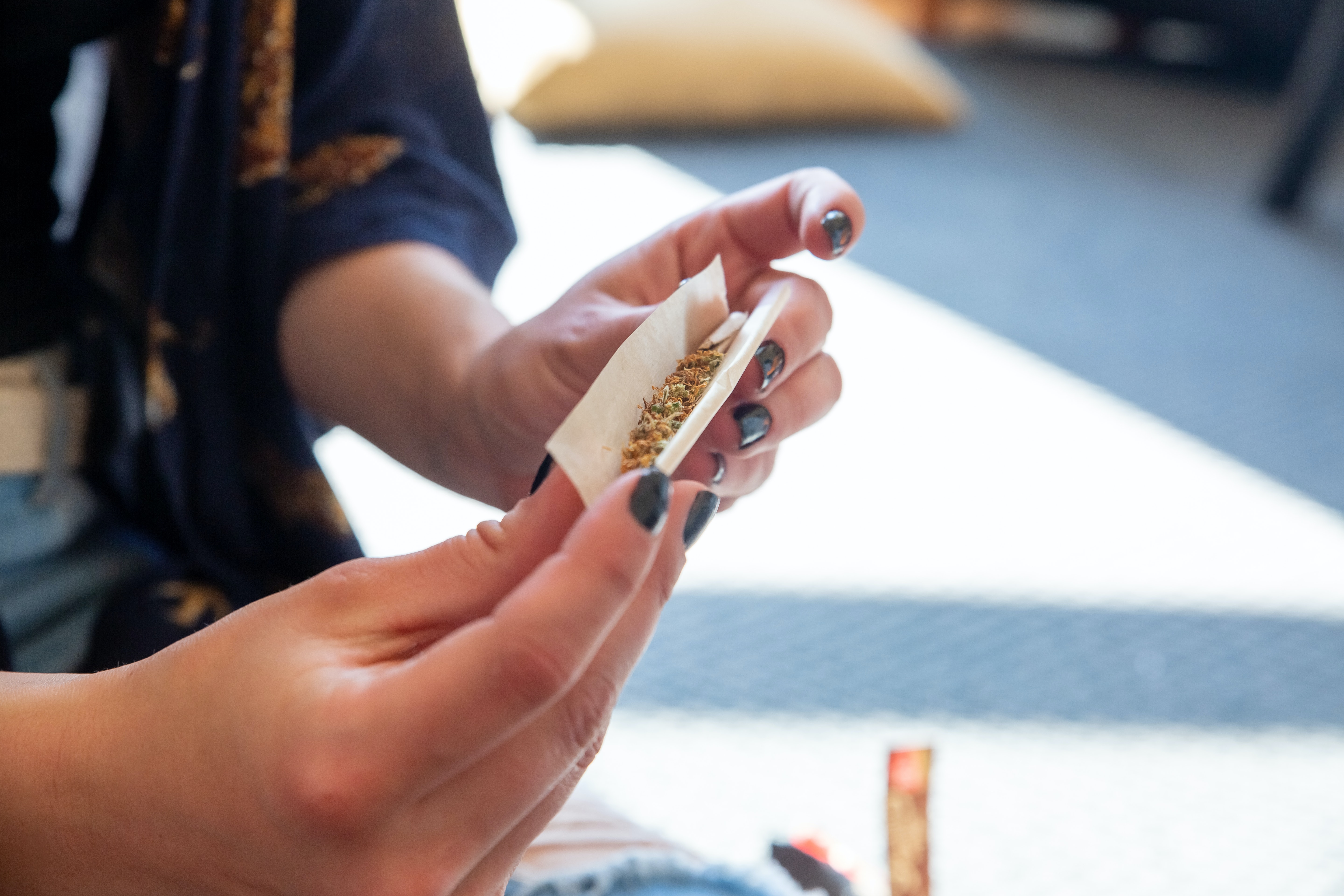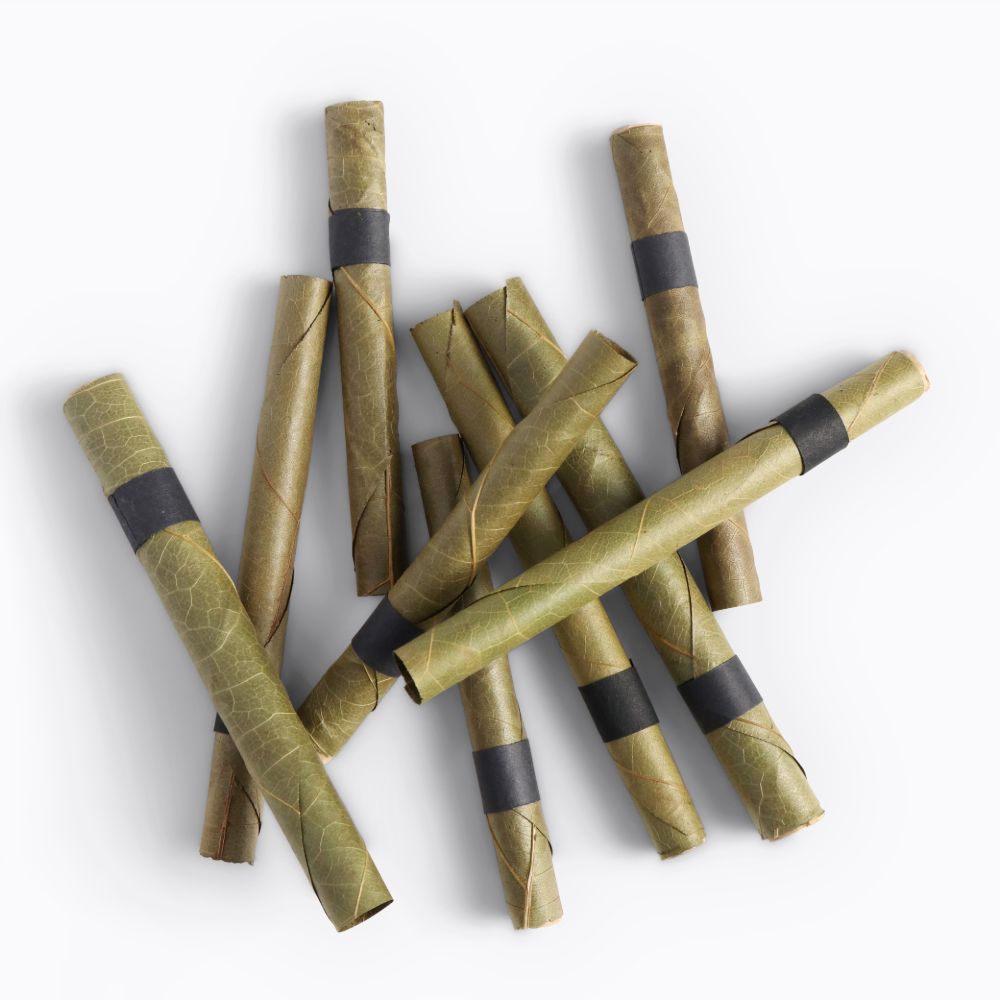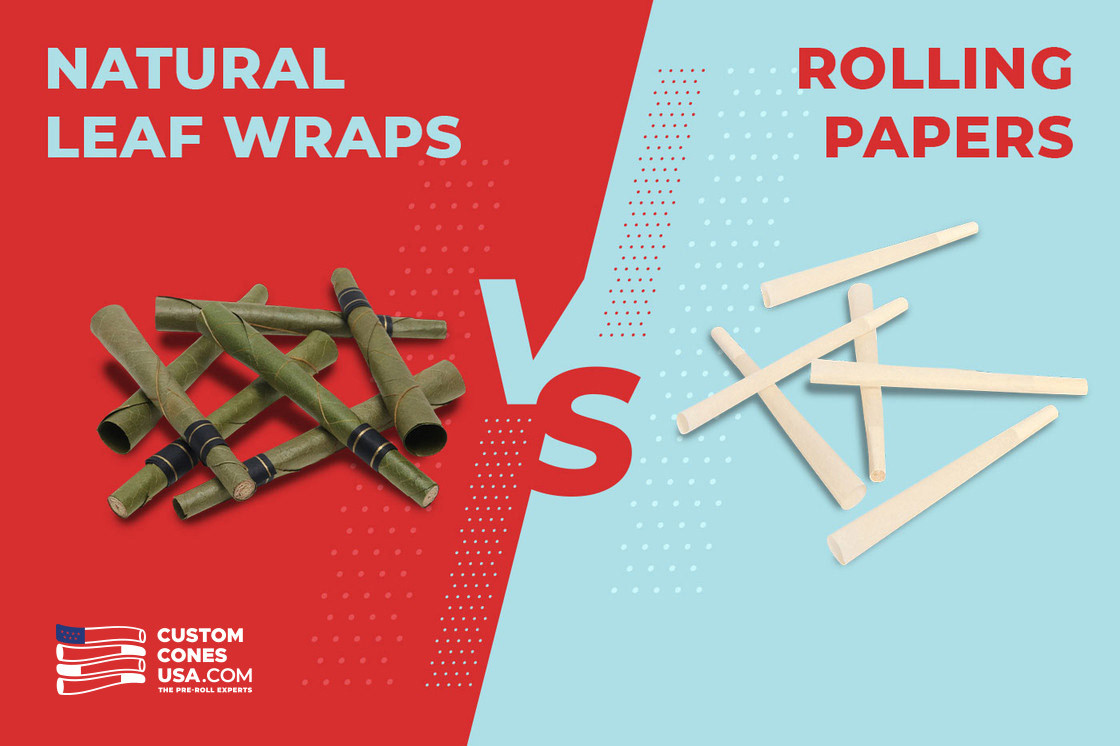Rolling Papers vs. Natural Leaf Wraps - Which Smokes Better?
Posted by Custom Cones USA on Jan 17th 2022
Updated June 9, 2023
Natural Leaf Wraps, Rolling Papers & Hemp Wrap Blunts
Rolling papers have been a classic option for cannabis smokers for decades. For many of us, it was the way we were introduced to cannabis, and a joint rolled in rolling paper is one of the most iconic images of cannabis use. As cannabis use becomes more widespread across the United States, pre-rolled joints and hemp blunts are becoming one of the most common ways to consume flower because of how easy they are to use and how easy they are to share. In addition to these common paper styles, alternative leaf options like Cordia and Tendu palm leaves also started to gain popularity.
Smokers enjoy pre-rolls with classic paper because it doesn’t impact the taste of the flower within the pre-roll, instead allowing the full taste of the flower to be the of star the show. On the other hand, smokers enjoy natural leaf blunts wraps because they add a robust flavor and smoke slower. Natural leaf blunt wraps also cool the smoke, and the filter options do more to filter small particles than the classic W paper filter pre-rolls are usually fitted with.

What are Cordia Palm Leaf Blunt Wraps?
Natural leaves have been extremely popular internationally, with cured banana leaves being amongst the first ways humans smoked cannabis, tobacco, or other herbal products. However, the United States market has historically seen an absence of natural leaf smoking options other than tobacco leaf wraps—that is, until recreational cannabis started hitting the shelves, and cannabis producers began seeking ways to make their products stand out amongst their competition.
The Cordia leaf features a luscious dark green color and grow across southeast Asia. The high amount of chlorophyll results in an earthy taste being added to the smoking experience—in contrast to the curing process of cannabis and tobacco, which remove chlorophyll from the plant in order to improve the smoking quality. This is why tobacco goes from green to a shade of dark brown.
Because the leaf is thicker than traditional rolling papers, it smokes slower and produces a thicker smoke. A tube shape is incredibly popular for Cordia leaf wraps, as it gives the feel of a cigar and provides a luxury-feeling smoking experience that makes brands stand out among competitors who commonly use a cone shape for their pre-rolls.

What are Tendu Leaf Blunt Wraps?

Similar in feel to the Cordia leaf wrap is the Tendu leaf wrap. The Tendu tree is found widely across central India, and is commonly used for thin, hand-rolled tobacco cigarettes. Since the Tendu leaf is flexible, it does not crack as easily when dry, and the soft texture makes it an amazing leaf to use for rolling. The tendu leaf has taken the US cannabis market by storm and has been incredibly popular in areas like Germany, the Middle East, and Japan (largely using them to roll tobacco).
What is the Difference Between Tendu Leaf and Cordia Leaf?
The biggest difference between the Tendu leaf and the Cordia leaf is the way that they are cured and prepared for use. The Tendu leaf is toasted, removing chlorophyll and other plant components. This results in a lighter color of leaf, and a less prevalent taste to interfere with the taste of the flower.
The toasting and curing process can help eliminate pesticides that have accumulated on the leaves. This makes it easier for Tendu leaf wraps to pass strict testing for recreational cannabis markets, but it will not affect issues related to heavy metals. Additionally, the curing process also makes Tendu leaf wraps more malleable and workable than the drier, more brittle Cordia leaf wraps.
Contamination Issues
The cannabis industry is highly regulated, so producers are required to follow strict testing guidelines when it comes to things like pesticides, heavy metals, and microbials. This ensures that the consumers can trust that what they are consuming is free from harmful contaminants, but, in most markets, it’s only the cannabis that is required to go through this type of testing.
Rolling paper manufacturers do not have testing requirements, so it is common to find natural leaf paper products that have pesticides on the leaves and heavy metals they picked up from the soil the plant was grown in. Also, because they are made with unrefined organic material, they are more likely to have issues with mold when compared to refined papers. This is also true of the corn husk filters that often come with these wraps.
At best, natural leaf wraps are inconsistent when it comes to being free from contaminants. Yes, it is possible to source natural leaf wraps that are free from pesticides and heavy metals, but they are going to be a lot more expensive—an expense that most pre-roll manufacturers won’t want to deal with. There are also a few states that require the entire pre-roll be tested for contaminants (filter and paper included) before it can be sold, and producers in those states typically don't want inconsistency in their ability to get products to the market is on the table.
This information is also significant for the consumers that like to buy natural leaf wraps and/or pre-rolls made with natural leaves. If “natural” and “organic” are things you care about, be sure you are checking to see if the natural leaf blunt wraps you are consuming have been tested for contaminants.
Uniformity Issues
One of the benefits of refined rolling papers is their uniformity. They can be made to measure and weigh almost exactly the same, which is important when it comes to pre-roll production. Weight is another important compliance issue, and when you can’t rely on your pre-rolled wrap to weigh the same, it makes verifying the weight of each problematic.
Also, when you are working with pre-roll filling machines, you need products to fit specific parameters. When there is too much variance between the unfilled cones/tubes, they won’t fit properly in the machines, or they will fill unevenly. Cordia Leaves and Tendu Leaves grow in a variety of sizes, so there is a large variability in the size of the blunt tubes. This means that some tubes may not fit into certain filling machines.
The Solution
If you want to avoid the headaches associated with finding clean natural leaf rolling papers, hemp wrap blunts are a great alternative. Like natural leaves, they are thicker than standard rolling papers, they create a more premium look for pre-rolled joints, and they burn slower. They will also dry out and crack easier than refined rolling papers, so it is important to keep them properly humidified when working with them.
Unlike natural leaves, the hemp wrap blunts are processed in a way that makes them less susceptible to mold and makes it easy to create uniform products. It is also easier to find hemp material that is free from heavy metals and pesticides. In short, hemp wrap blunts give you all the benefits of natural leaf papers without any added drawbacks.
In short, there’s a reason we don’t sell palm leaf products in the Custom Cones USA store anymore. Our hemp wrap blunts are guaranteed to be free of pesticides and heavy metals, and with the proper care, they can easily stay free from mold and work with pre-roll filling machines. This means you get a product that is better quality and can be made quicker!
If you have questions about how you can take your pre-rolled blunt production pre-rolled blunt production to the next level, reach out to our Pre-Roll Experts, and they will walk you through everything you need to know!
Natural leaves have been extremely popular internationally, with cured banana leaves being amongst the first ways humans smoked cannabis, tobacco, or other herbal products. However, the United States market has historically seen an absence of natural leaf smoking options other than tobacco leaf wraps—that is, until recreational cannabis started hitting the shelves, and cannabis producers began seeking ways to make their products stand out amongst their competition.

